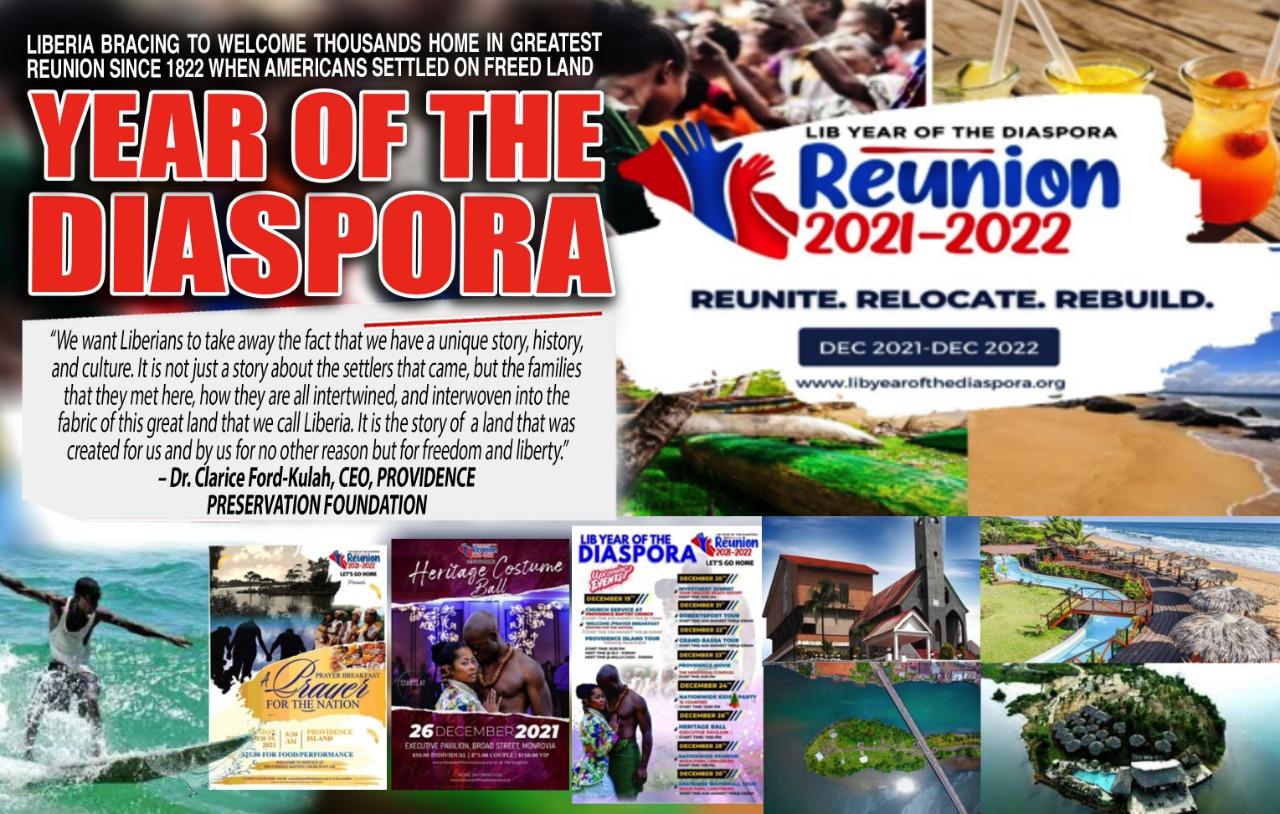Africa-Press – Liberia. Nearly two hundred years after the American Colonization Society and a group of African Americans who wanted a place they could call home, settled in Liberia, Africa’s oldest republic is bracing for the historic reunion in hopes of jumpstarting and rebranding the land of the country’s forefathers.
The Year of the Diaspora, Reunion 2021-2022 in collaboration with the Government of Liberia’s Bicentennial Commemoration, aims to celebrate 200 years of that movement. After 40 years of a slow-down, Liberia is excited to welcome Africans in the Diaspora home again. Situated on prime real estate along 360 miles of unbroken coastline and the largest remaining portion of the upper Guinea rainforest, Liberia will host the Bi-Centennial Celebration by inviting Africans in the Diaspora to the greatest reunion ever. This is also an invitation to join in the rebuilding of the only nation in Africa founded as a haven for freed blacks from all around the world.
“After all of our struggles, trials, it’s time for Liberians to come together as one, invite their African-American brothers/sisters, their Diasporan cousins, and the like to come celebrate this beautiful country that was created in love,” says Clarice Ford-Kulah, CEO of the Providence Preservation Foundation, one of the organizers of a series of events aptly timed to showcase the country’s culture, heritage, and rich history.
Rich Culture, Rich History
Ledgerhood Rennie, Minister of Information, Culture Affairs and Tourism says it is welcoming to have Liberians in the Diaspora think positively about their country and contributing to its rebuilding efforts through such initiatives. “At the level of the National Steering Committee we are energized to work at enabling such a worth venture that dovetails into the commemoration of the founding of our country 200 years ago with the arrival of our African brothers and sistren these shores from the United States”.
Rennie says the government has been engaged with Dr. Ford Kulah and team and will assist as possible in ensuring the series of events as planned go on unhindered. “These events are significant in our collective efforts at rebranding Liberia- our country that’s endowed with a rich history, enviable culture heritage and immaculate tourism attractions, after a period of many social and political mishaps”.
The celebration is poised to showcase some high-profile entertainers including celebrated American actor John Amos of the famed Good Times comedy series, Coming to America, Roots, etc. and his son, KC Amos, a writer/producer.
Stars Descending on Monrovia
Comedian Michael Blackson, who recently starred in Eddie Murphy’s Coming to America II is also expected to perform while Rep. Naqueta Ricks, a Liberian representing the US State of Colorado in the state legislature and Dr. Arikana Chihombori-Quao, former AU Ambassador and CEO of African Diaspora Development Institute (ADDI). Dr. Chihombori-Ouao is a diaspora affairs guru and responsible for Wakanda 1 City being built in Ghana.
Rep. Ricks says the Year of the Diaspora commemorates Liberia’s rich history and significance. “It is also a time to reimagine Liberia’s next 200 years and the investments required to build and establish the Liberia we desire.”
From December of 2021 to December of 2022, the African Diaspora from America, the Caribbean, Europe, and other countries and continents around the world will storm Liberia for the cultural experience of a lifetime as we celebrate Liberia’s bi centennial. The group will be greeted at the airport with a welcoming like none other. Cultural dancers, drummers, and traditional activities will be the center of their welcome. The next morning will begin with a one hour service at the Providence Baptist Church (the first church build in Liberia, founded by Lott Carey) and a welcome Prayer Breakfast at Providence Island. After praying for the nation, we will have a traditional Liberian breakfast, followed by a reenactment of the coming of the African Americans to Liberia and their first meeting with the people local to the land.
This will be followed by week-long tours to exciting destinations (original settlements and beach concerts featuring top local artists, shopping in select locations, food tasting, etc.) that are sure to sell Liberia to the world as the tourist destination of 2021/2022. Amazing activities will include the Heritage Ball where we celebrate the history and culture of Liberia, highlighting the 15 counties and their ethnic groups, a nationwide Christmas party for the Children in each county, an investment summit, film screening of “Providence” movie with a panel discussion on bridging the gap between Africans and African-Americas, Liberians, etc, meet/greet comedy night with Comedian Blackson, a traditional naming ceremony, etc. Other events presented by other groups include Runway Liberia Fashion Show, Idol Talent Competition, Family Beach Day at Libassa, and a host of others. The major activities will culminate with an old fashioned barbecue/cookout at Wulki Farms with horseback riding, swimming, storytelling, golfing, and most importantly, some good, old fashion meat on the grill.
“The Year of the Diaspora commemorates Liberia’s rich history and significance. “It is also a time to reimagine Liberia” s next 200 years and the investments required to build and establish the Liberia we desire.”
Bicentennial Four Years in the Making
Organizers say planning has been long in the making and it is anticipated that the showcase will once again herald the rich cultural and lost history of Liberia.
“We have been planning this for four years now, Dr. Ford-Kulah explains. “We started in 2017. We even shot the film “Providence” with hopes of having the African Diaspora, especially African Americans, to watch it and understand the story as we prepared for our 2021 opening. We selected 2021 because it is the prelude to 2022. You see, the land was purchased in December of 1821, again, as a prelude to the final move in 1822.”
The movie, Providence tells the story of two sisters, two families and two lives that collide in a heart- wrenching tale of love and the pursuit of happiness. Built upon the backdrop of the former African-American slaves’ first trip to Africa after the abolishment of slavery and the relationships formed with the indigenous people, Providence explores the aristocracy of the African- Americans on that first trip, their political prowess, the history of Liberia and the very fabric of its existence.
Dr. Ford-Kulah is hoping that Liberians embrace the epic Year of the Diaspora and take away the fact that the country has a unique story, history, and culture. “It is not just a story about the settlers that came, but the families that they met here, how they are all intertwined, and are interwoven into the fabric of this great land that we call Liberia. It is the story of a land that was created for us and by us for no other reason, except for freedom and liberty. As such, it is time that we use that liberty to take control of our own destiny by helping to rebuild our country. Whether we live abroad or in country, we must stop complaining. We must simply begin to love on Liberia and do whatever it takes to make her the pinnacle as she once was.”
Among the events planned to commemorate the year, are week-long tours to exciting destinations (original settlements and beach concerts featuring top local artists, shopping in select locations, food tasting, etc.) that are sure to sell Liberia to the world as the tourist destination of 2021/2022.
‘Prayers for the Nation’
Dr. Ford-Kulah says the occasion will open with “A Prayer for the Nation. “This is where we will hold hands and pray for our nation, as one family. We will begin with a one-hour service at Providence Baptist (for those who want to attend). We will have 86 people standing in the gap for those 86 that left the United States on that first ship. The service will highlight Old Negro Spirituals/African worship.”
After service, visitors will go down to Providence Island for our prayer, followed by traditional Liberian breakfast and the reenactment of the Settlers arrival and the local families they met on the island.
As the event culminates, those who paid for the Providence Island Tour will be taken on a magical wonderland of history and culture starting with the live signing of the Declaration of Independence, the sewing of the flag, just to name a few.
Organizers says amazing activities will include the Heritage Ball where we celebrate the history and culture of Liberia, highlighting the 15 counties and their ethnic groups, a nationwide Christmas party for the Children in each county, investment summits, Film Screening of “Providence” movie with a panel discussion on bridging the gap between Africans and African-Americas titled “A Nationwide Dialogue: 200 Years Later, Where are We Now?.
“These events are significant in our collective efforts at rebranding Liberia- our country that’s endowed with a rich history, enviable culture heritage and immaculate tourism attractions, after a period of many social and political mishaps”.
Commemorating Two Centuries of History
Liberians will also get a chance to a meet and greet comedy night with Michael Blackson, which will also include a traditional naming ceremony. Other events presented by other groups include Runway Liberia Fashion Show, Idol Talent Competition, Family Beach Day at Libassa, Champaign Ball, and a host of others. The major activities will culminate with an old-fashioned barbecue/cookout at Wulki Farms with horseback riding, swimming, storytelling, golfing, and most importantly, some good, old fashion meat on the grill.
Dr. Ford-Kulah says the celebration culminates nearly two centuries of a nation birthed on Providence Island, a home that once stood at the pinnacle of Africa’s decolonization, a home that has persisted in the face of atrocities and today remains more united than ever, a home where nature, culture, landscape, beaches, and history await a glorious moment to be lived. “When you hear these words, what crosses your mind? Is it a ploy for tourism, an invitation to be a part of something great, a welcome home from our ancestors? Well, if you haven’t heard, Liberia is commemorating its 200-year anniversary. As such, you are all invited to the greatest reunion since 1822, when the country was founded by the American Colonization Society and a group of African Americans who wanted a place that they could call home, a place where every person of color could truly be free! Year of the Diaspora wishes to commemorate 200-years of that movement, 200-years of ups/downs. Why now? Because now is the appointed time.”
As far back as the early 1800s, opposers of slavery were planning ways to abandon the institution. As time drew closer to the abolishment of slavery, Southerners were adamant that freed slaves could not share the same privileges as their white counterparts. There were major controversies over the fact that the African slaves and whites would be fighting for the same jobs, opportunities, accommodations, and the like.
Some believed that the Africans would never truly be free in America. Thus, was the premise for the emigration of blacks to Africa. Birthed as the brainchild of Rev. Robert Finley in 1816, the American Colonization Society was established for the resettlement of ex-slaves. Paul Cuffe, a notable African American abolitionist held the belief that freed blacks could in fact establish a colony in West Africa that would be prosperous.
In February of 1820, a ship known as the Elizabeth, left New York carrying 86 African Americans and several agents of the American Colonization Society. The ship first settled on Sherbro Island in modern day Sierra Leone. After a year and many hardships and deaths due to malaria and other illnesses local to the region, the settlers had no choice but to move on. After securing land from a Bassa chief, the settlers finally found a home in December of 1821 and began arriving in January of 1822 on Providence Island which is now known as Liberia.
With help from the American Colonization Society, the colony developed greatly and proclaimed its independence in 1847, thereby electing Joseph Jenkins Roberts, a freed African American from Virginia, as its first president.
Between 1821 and the 1860s, numerous ships sailed into Liberia, repatriating freed blacks. Liberia and America traded in coffee, palm oil, and other commodities during this period. At the signing of the Emancipation Proclamation, President Joseph Jenkins Roberts was in the White House and played a role in the process. The first 10 Presidents of Liberia were African Americans who played leading roles in world history during their Presidencies.
Pinnacle of Decolonization
Standing as the only independent nation in West Africa, Liberia was able to maintain her independence during the scramble for Africa by European colonizers. With the support given Liberia by America, the 1920’s in Liberia saw great prosperity. Relying mostly on natural resources and rubber, Liberia boomed and blossomed. Under the leadership of President William Tubman, William Tolbert, and a host of other presidents who were all of American descent, Liberia became a beacon in West Africa.
Liberia has been at the pinnacle of Africa’s decolonization as well as in the fight for black freedom in America and on the continent. Sending the first black and second woman in history to head the United Nations, Angie Brookes Randolph led the fight towards the independence of West African nations.
As a result of Liberia’s lead position in the emancipation of blacks, the Country became a mecca for African Americans in the 60s and 70s. Notables as Maya Angelou, Nina Simone, Hugh Masekela, Jeanetta Cole, Miriam Makeba, Bill Russell, Linda Thomas Greenfield,John Amos, and many more called Liberia home or their second homes. Liberia’s open-door policy and bold stance against apartheid and support of black freedom fighters furthered the 1820s movement that this was the home for blacks in search of a place to feel 100% at home.
For More News And Analysis About Liberia Follow Africa-Press






